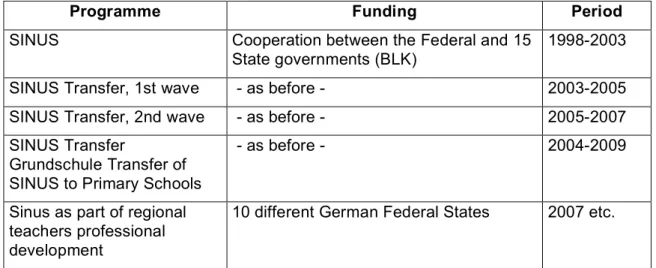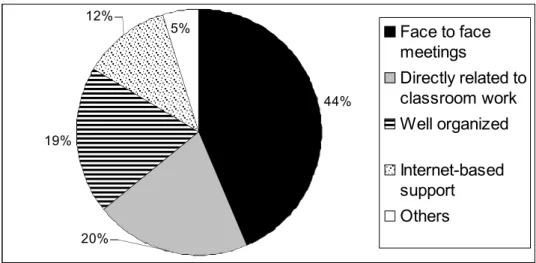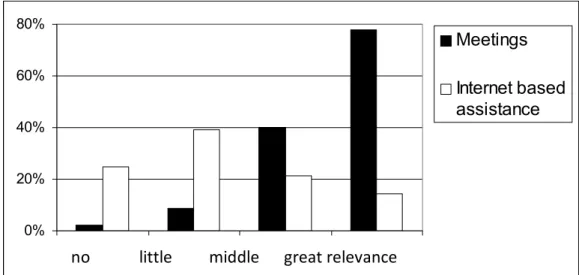NEW PROGRAMMES FOR TEACHERS' PROFESSIONAL
DEVELOPMENT IN GERMANY
The programme SINUS as a model for teachers' professional development
Martin Lindner IPN Kiel lindner@ipn.uni-kiel.de
Abstract
SINUS ('Increasing the efficiency of science and mathematics instruction') was initiated in 1998 as a reaction to the comparably poor TIMS-Study results. Using the experience from SINUS several programmes with a similar structure were created in Germany, but only SINUS led to some dissemination activities on national level. This article describes the main characteristics of the programme and gives an overview of the evaluation results.
Keywords: Teachers' professional development; Science and mathematics teaching; Learning communities; Evaluation of professional development initiatives.
Resumo
O Projecto SINUS ('Increasing the efficiency of science and mathematics instruction') foi iniciado em 1998 em reacção aos maus resultados obtidos no estudo internacional TIMSS. A partir da experiência do SINUS foram criados na Alemanha vários programas com uma estrutura semelhante. Contudo, apenas este programa conduziu a actividades de disseminação a nível nacional. Este artigo descreve as principais características deste programa e apresenta uma visão geral dos resultados da sua avaliação.
Palavras-chave: Desenvolvimento profissional de professores; Ensino das ciências e da matemática; Comunidades de aprendizagem; Avaliação de iniciativas de desenvolvimento profissional.
The German educational system does not allow central programmes for the development of learning and teaching materials. The responsibility for all decisions on school education lies in the education ministries of the 16 Federal States. Due to this, it was an innovation that the comparable poor results of the TIMS-Study in 1996 led to a cooperation between the national and 15 state ministries to foster mathematical and science teaching in the whole of Germany. SINUS was the first of about 10 programmes of this size in Germany; others dealt with education for democracy, with life long learning or vocational trainings. Political changes led to an end of these cooperations in 2006. However, one of the results of a nation-wide cooperation was the publication of the national standards in education, which were released in 2003 for the core subjects (German, Mathematics, Foreign Languages, and Sciences).
SINUS ('Increasing the efficiency of science and mathematics instruction') was started in 1998. Learning from the first five years of the SINUS-Programme a broad transfer programme was launched in 2003 (SINUS Transfer). SINUS activities comprised three phases: the first phase developed and tested the strategy and the concepts of the programme; the second phase allowed the gathering of experience in transferring the basic strategies to new teachers; the third and present phase is centred in dissemination to teachers and school levels which were not involved before. This last phase is not longer done on a national level, but on the Federal States’ level.
Programme Funding Period
SINUS Cooperation between the Federal and 15
State governments (BLK) 1998-2003
SINUS Transfer, 1st wave - as before - 2003-2005
SINUS Transfer, 2nd wave - as before - 2005-2007
SINUS Transfer
Grundschule Transfer of SINUS to Primary Schools
- as before - 2004-2009
Sinus as part of regional teachers professional development
10 different German Federal States 2007 etc.
Table 1: Overview of SINUS’ phases: For aims and structure of the programmes see Prenzel and Ostermeier (2003) and Prenzel et al. (2002)
Characteristics of the Programme
Teachers who join the programme meet regularly (six or eight times a year; usually in the afternoon) over a period of at least 2 or 3 years. They work in teams of 3-10 persons. The meetings are filled with classroom-oriented work (focused on subject issues and teaching methods) combining different teachers’ experience. During these meetings, teachers develop tasks, lessons or whole curricula for their classrooms. After implementing the planned lessons, the team members gather again to evaluate the trying out process and improve materials and strategies. The work is coordinated at regional and state level by teachers with a reduction on their weekly workload.
During SINUS meetings teachers experience the learning methods they are supposed to implement in their own classes. In these meetings only short introduction lectures are held. The essential work takes place in a workshop format with high activity of the members. The results are published predominantly on the programmes homepages so that all teams could join the developmental process. This learning structure presents a new teaching and learning model which intends to help breaking the Socratic method – which still dominates German classrooms – and to finish the role of teachers as “single combatant”, enforcing teamwork at schools.
Some Results
The experiences of the colleagues involved in the programmes were evaluated through questionnaires and interviews. Some results were gained through focus-group discussions. The answers of the interviews were categorized through three experts and calculated with SPSS. A larger scale research was done by Prenzel et al (2002).
The clearest result is the strong role of the team-based work in teachers’ personal and professional development. Most answers refer to the positive effect of teamwork, of sharing ideas and classroom materials and of the good and friendly atmosphere created in the teams (Fig. 1). Reliability, confidence and sympathy were mentioned as group stabilizing factors.
The reported negative experiences show again the strong effect of teamwork: the lack of teachers’ cooperation in some groups is seen to be a hindering factor for a successful work. Other personal habits like too little care about commitments are also experienced as hindering the work.
44% 19% 20% 12% 5% Face to face meetings Directly related to classroom work Well organized Internet-based support Others Figure 1: Assessment of the effect of different factors in the SINUS programme seen as positive by the participants. N = 109
Many colleagues felt rewarded by the fact that both “officials” and researchers acknowledged their teaching competence and practical expertise. This led to statements as: “Being teacher now for 25 years, I have not been taken seriously just like in this programme” or “Till now, I was always seen by the ministry as executing something ‘from above’, now I can contribute through my competences to the development process”.
Financial motives like the weekly workload reduction – offered to the teachers involved in SINUS’ first phase – were considered less important. Less than 50% of the teachers mention it as a positive factor for their engagement. The “acknowledgement effect” was presumably just as important as the economic advantage (Fig. 2).
0 10 20 30 40 1 2 3 4
no little middle great Relevance of weekly workload reduction
Figure 2: Significance of weekly workload reduction (SINUS, n = 45, more than one answer possible)
0% 20% 40% 60% 80% 1 2 3 4 Meetings Internet based assistance Figure 3: Importance of face-to-face meetings vs. internet-based assistance (SINUS, n = 45)
Discussion
Figure 4: Answers to the questions dealing with experiences in collaboration in SINUS after 3-4 years of participating (n:=45), 4 point Likert-scale, mean: 2,5
1: strongly disagree, 4: strongly agree. The bar indicates standard deviation.
In the beginning of the programme the function of the Internet as an exchange and working platform was quite euphorically expected to be highly effective. However,
no little middle great relevance
1 1,5 2 2,5 3 3,5 4 C o la b o ra tio n In te n se co lla b o ra tio n C o lla b o ra tio n le a d s to r e d u ct io n in w o rk lo a d P o si tiv e a tt itu d e to w a rd s co lla b o ra tio n P a rt ic ip a n t is e xp e ri e n ce d in co lla b o ra tio n H e a d m a st e r su p p o rt s co lla b o ra tio n M e e tin g s a re sc h e d u le d 4 3,5 3 2,5 2 1,5also stresses the importance of face-to-face teamwork for innovative processes. So, the role of internet-based collaboration should be estimated carefully.
The feeling of belonging to a community helped the teachers to cope with worst working conditions due to a reduction of school education financial support by German state governments. Statements as “I like to test new methods and can more easily cope with things which are going in wrong direction” shows a new culture of trial and error learning, which is easier to establish in groups than in lonely work (see also Shulman, 1997, and Terhard, 1999).
Some teachers also mentioned the impact of the programme on their reflection about classroom practices: ”I have never thought about my lessons so much as during my work in the programme”.
SINUS evaluation concerning the promoted level of teachers’ collaboration (Fig. 4) revealed that even if this practice is well accepted and implemented, an intense collaboration involving the exchange of teaching experience and materials is seldom (second column). Some teachers experience a reduction in workload through collaboration (third column). The positive attitude towards collaboration was quite high before the programme started and quite a lot of participants had collaboration experiences. The last two columns show supporting structures at schools. The collaboration is highly effective if the headmasters support this practice, namely through the establishment of a common date for meetings in the weekly schedule. References
Gräsel, C., Nentwig, P. & Parchmann, I. (2005). Chemie im Kontext: Curriculum development and evaluation strategies. In J. Bennett, J. Holman, R. Millar & D. Waddington (Eds.), Making a difference: Evaluation as tool for improving science education (pp. 53-66). Münster: Waxmann.
Ostermeier, C., & Prenzel, M. (2002). Opportunities for teachers to learn: A study of teachers' acceptance of support measures within a national quality development program. Paper presented at the Annual Meeting of the American Educational Research Association (AERA), New Orleans.
Prenzel, M., & Ostermeier, C. (2003). Improving mathematics and science instruction: A program for the professional development of teachers. Paper presented at the
10th Conference of the European Association for Research on Learning and Instruction (EARLI), Padova (Italy).
Prenzel, M., Ostermeier, C., Duit, R., & Geiser, H. (2002). Improving science and mathematics education in Germany – The concept of a national quality development program and research on its implementation. Paper presented at the Annual Meeting of the National Association for Research in Science Teaching (NARST), New Orleans.
Shulman, Lee S. (1997). Communities of learners & communities of teachers. Monographs from the Mandel Institute. Jerusalem: The Mandel Foundation. Terhard, E. (1999). Developing a Professional Culture. In M. Lang, J. Olson, K.-H.
Hansen & W. Bünder (Eds.), Changing schools/changing practices: Perspectives on educational reform and teacher professionalism (pp. 27-39). Luvian: Garant.


